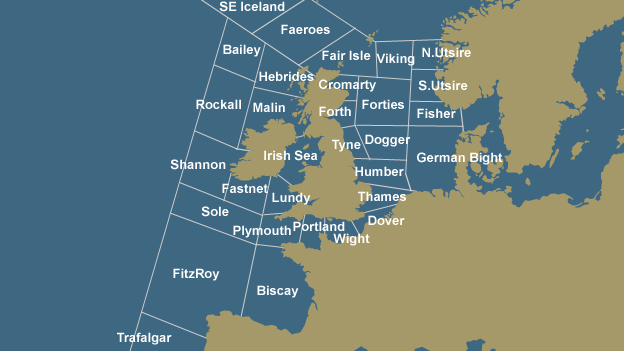When I lived in the UK, I would often fall asleep and/or wake up to the Shipping Forecast: a BBC Radio broadcast of weather reports and forecasts for the seas around the coasts of the British Isles.
Though I had, of course, no real need of the Forecast, on many occasions it lured me like the voice of a hypnotic siren (especially, I must admit, when read by a woman). When I moved back to the US in 2003, I missed hearing the Forecast on the radio, but thankfully one can listen to it at Radio 4 online. Although the online stream lacks the delectable sonic texture of long wave radio, the Forecast still has the power can still reel in its listeners.
Last December, I followed a brilliant series on NPR which highlighted the BBC Shipping Forecast. I intended to publish it here on the SWLing Post at the time, but somehow lost it in the shuffle of a busy travel season. Fortunately, NPR has archived audio from the series online. I love their introduction:
“It is a bizarre nightly ritual that is deeply embedded in the British way of life.
You switch off the TV, lock up the house, slip into bed, turn on your radio, and begin to listen to a mantra, delivered by a soothing, soporific voice.
“Viking, North Utsire, South Utsire, Forties, Cromarty, Forth, Tyne, Dogger ….” says the voice.
You are aware — vaguely — that these delicious words are names, and that those names refer to big blocks of sea around your island nation, stretching all the way up to Iceland and down to North Africa.
The BBC’s beloved Shipping Forecast bulletin covers 31 sea areas, the names of which have inspired poets, artists and singers and become embedded into the national psyche.
Your mind begins to swoop across the landscape, sleepily checking the shorelines, from the gray waters of the English Channel to the steely turbulence of the Atlantic.
Somewhere, deep in your memory, stir echoes of British history — of invasions from across the sea by Vikings, Romans and Normans; of battles with Napoleon’s galleons and Hitler’s U-boats.
Finally, as the BBC’s Shipping Forecast bulletin draws to a close, you nod off, complacent in the knowledge that whatever storms are blasting away on the oceans out there, you’re in your pajamas, sensibly tucked up at home”
You can listen to the series on NPR, or via the embedded player below:
Click here to listen to the Shipping Forecast on the BBC Radio 4 website. Also, check out the history of the Shipping Forecast on Wikipedia and from this excellent article by Peter Jefferson in Prospero (PDF, page 10).


Hi,
I worked at the Droitwich Transmitting Station through 1972-1974, the home of the BBC UK Long Wave 1500 m/200 kHz service as it was then.
In the summer of 1973 I was junior member of the engineering team, a 21 year-old Technical Assistant, and manned the control room for the four services from the site, Radio One, 1214 kHz, Radio Two, 200 kHz and Radio Four, 1052 kHz.
It was customary to check the two 200 kW transmitters, T7A and T7B for power balance prior to the Shipping Forecast and I duly went out in the transmitter hall just before the start at 1355.
I noted one was a little down and the other a little high so I pressed what I thought was the raise / lower buttons on the control desk. Unfortunately I had pressed the main on/off buttons instead.
The pair of transmitters came instantly off the air. I could hear on the audio monitoring the announcer starting the broadcast… it takes a while to reinstate the mercury arc rectifiers as the regulators had to run all the way down to zero and then back up to 14 kV.
By the time I had got it back on the air he was just finishing so we had to contact London and arrange a repeat after the 1400 news bulletin… Ooops!
I was much more careful after that when adjusting the transmitters.
The Senior Maintenance Engineer was not best pleased, as he had to write up the shutdown report for London citing “Operational Error” as the cause.
Happy Days…
Dave G4OYX.
Dave, that is a brilliant story! Thank you for sharing!